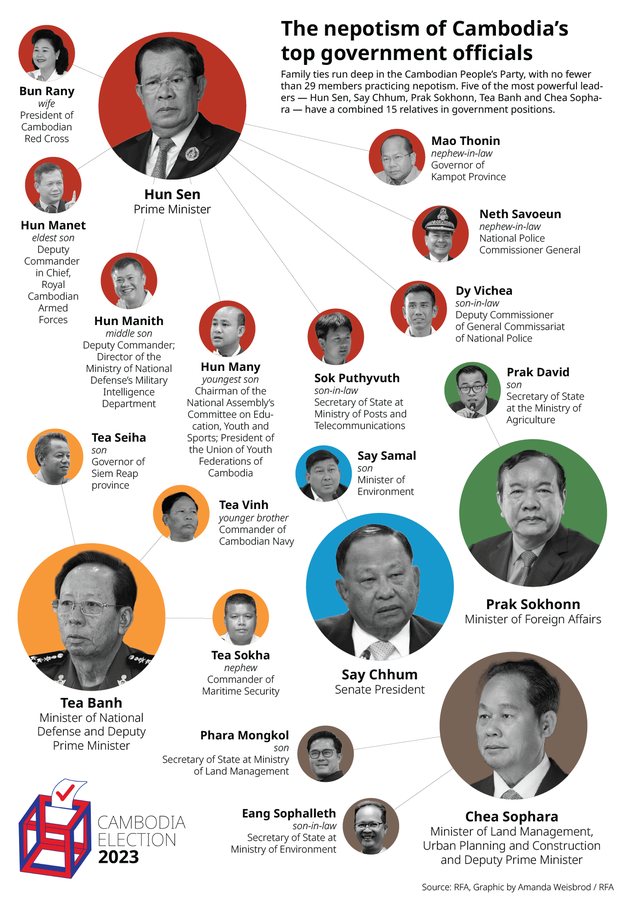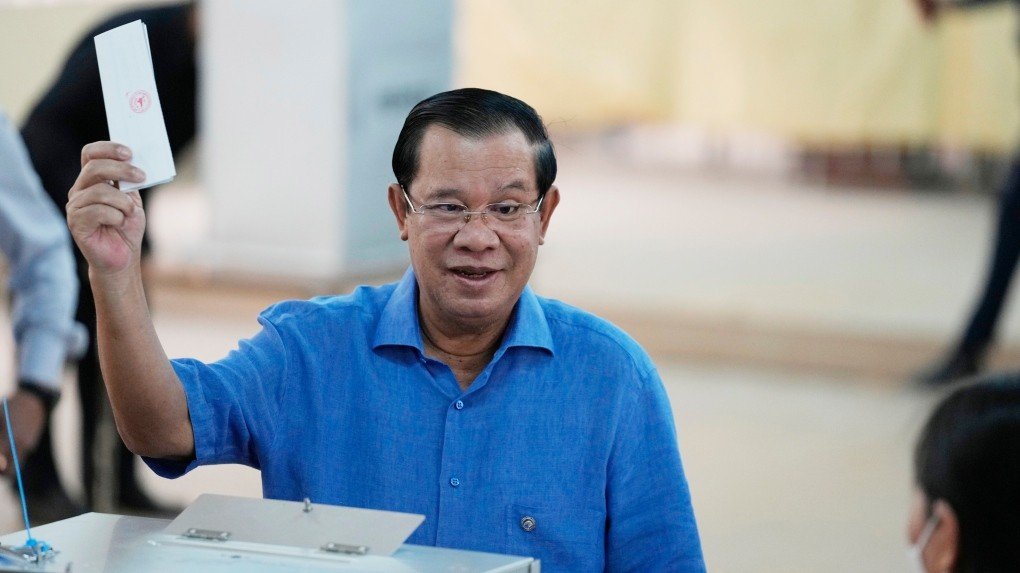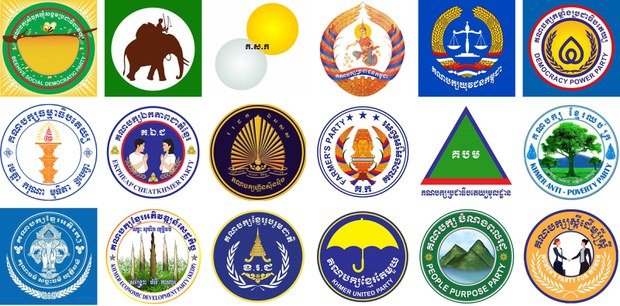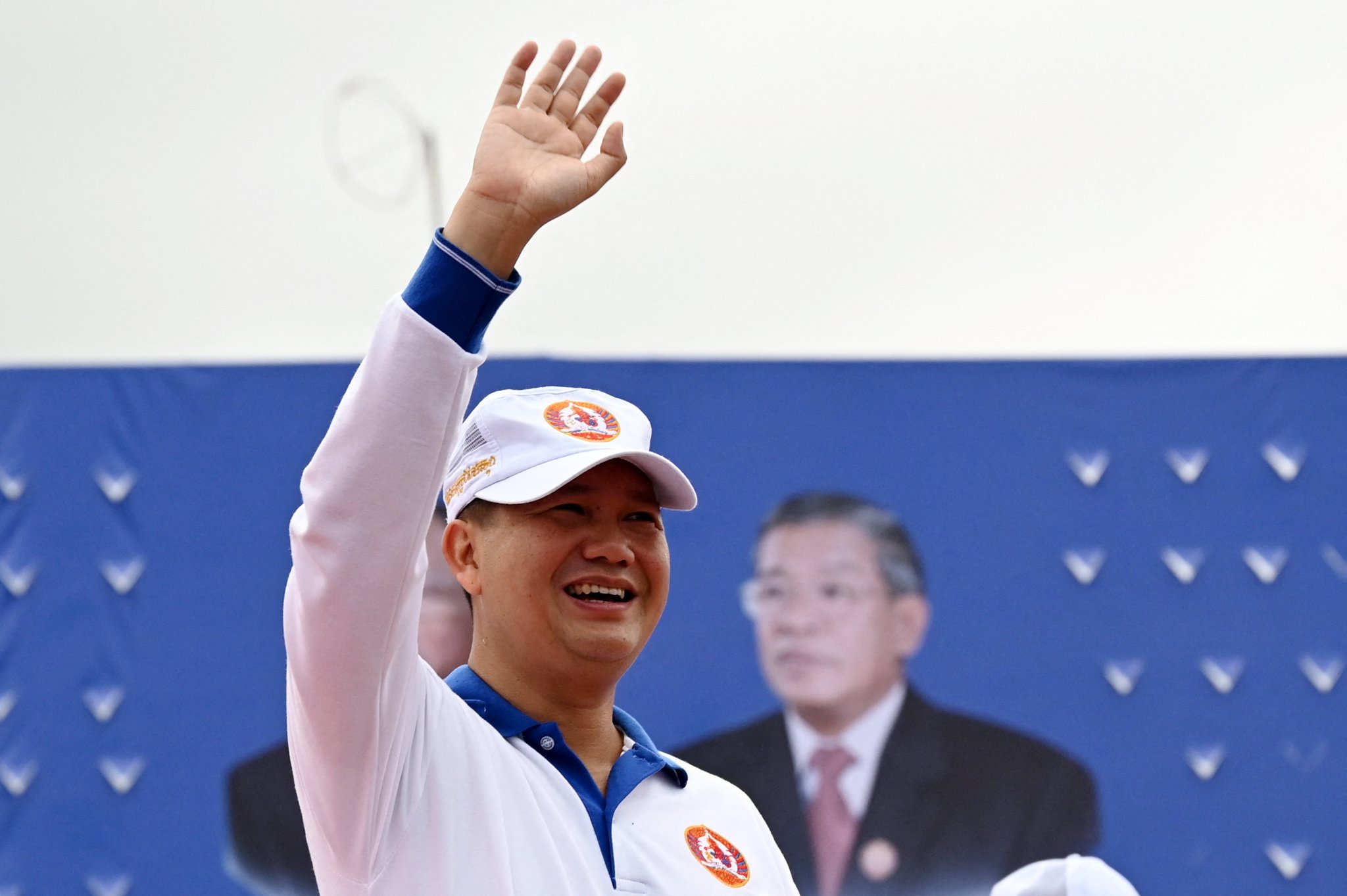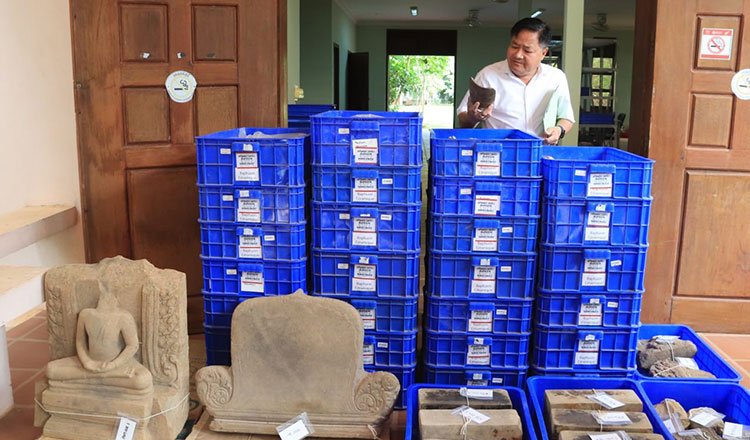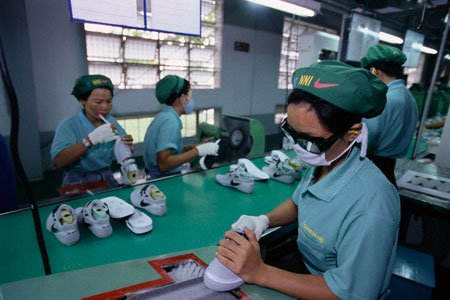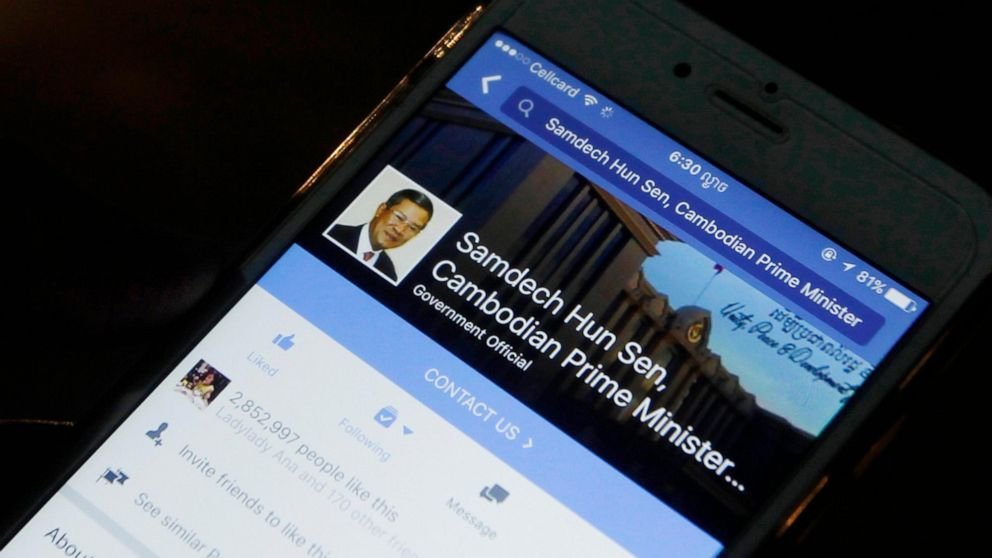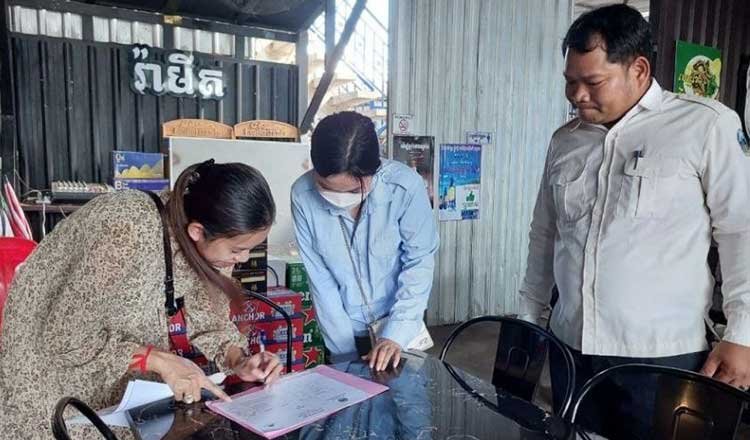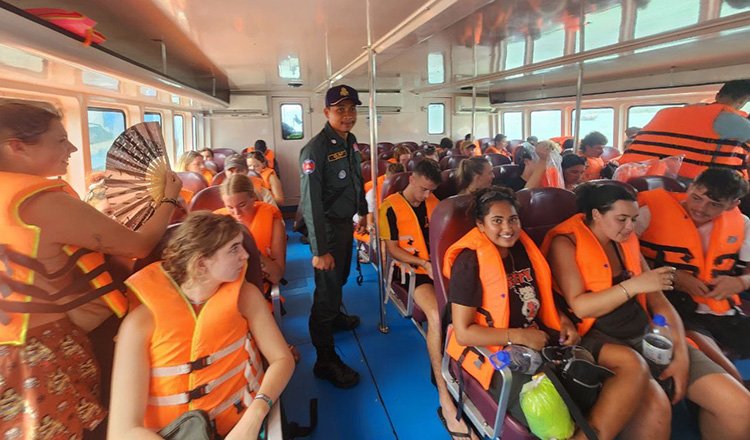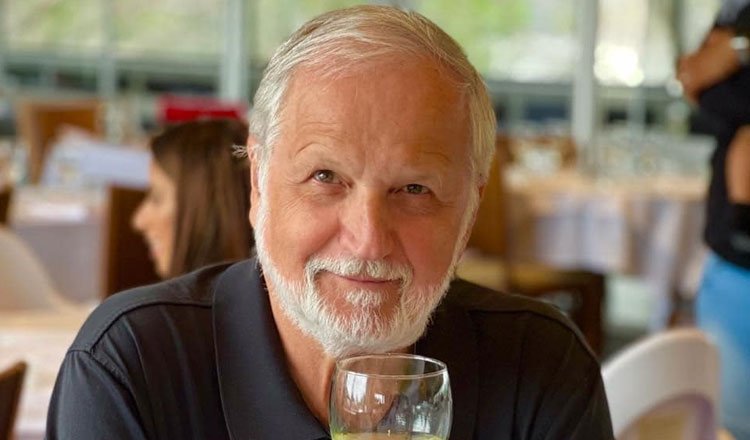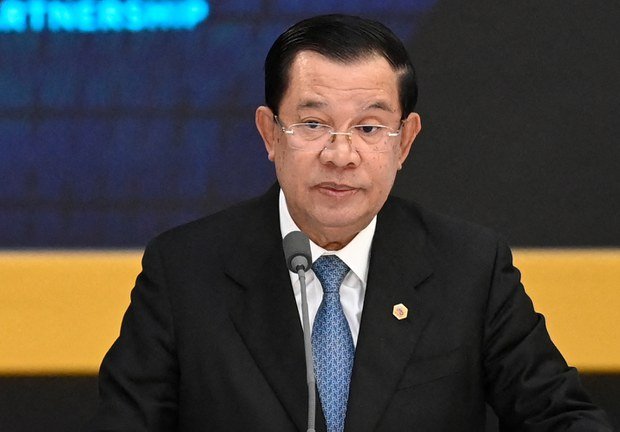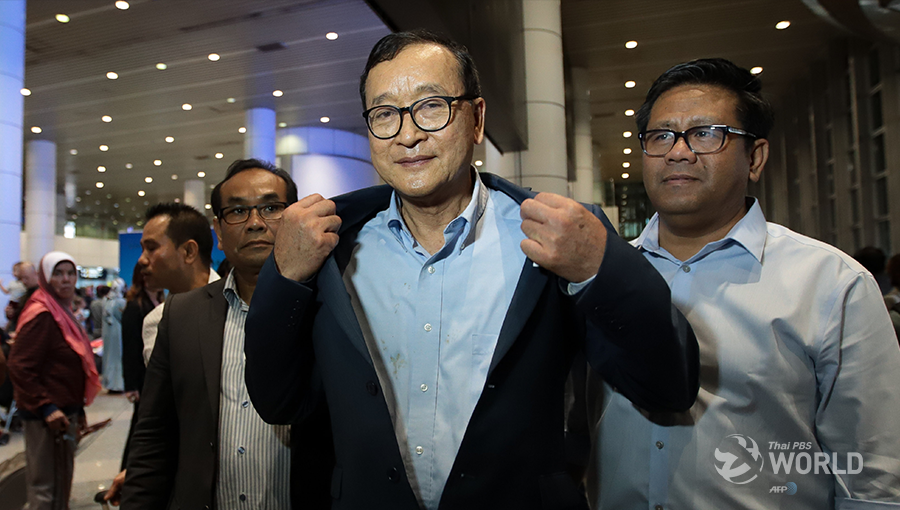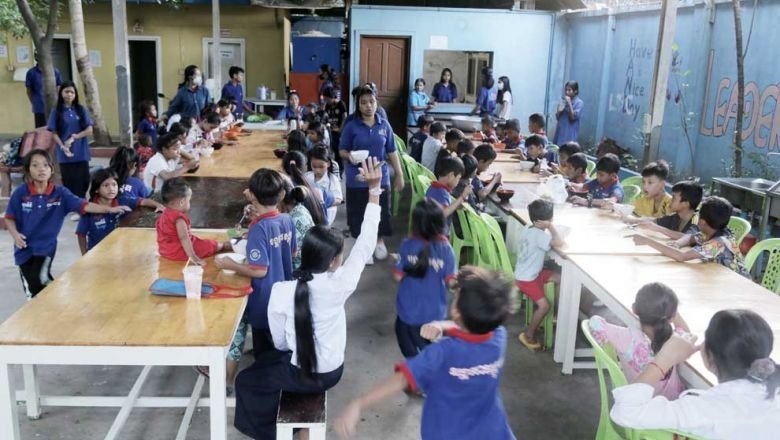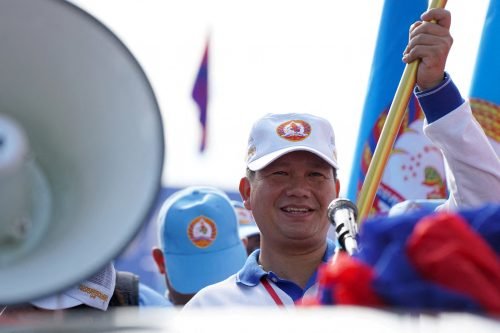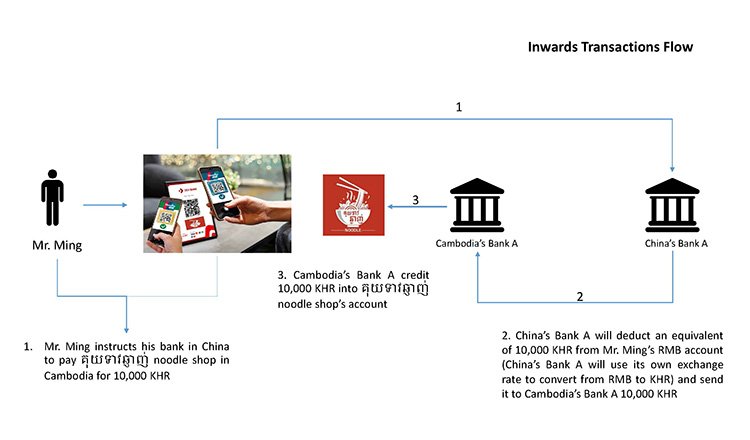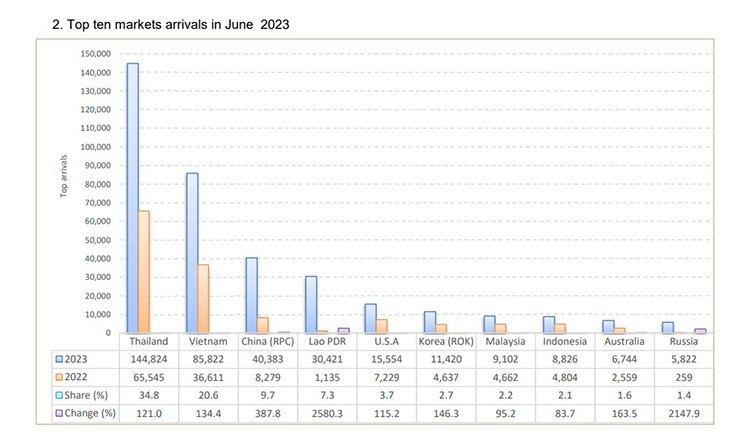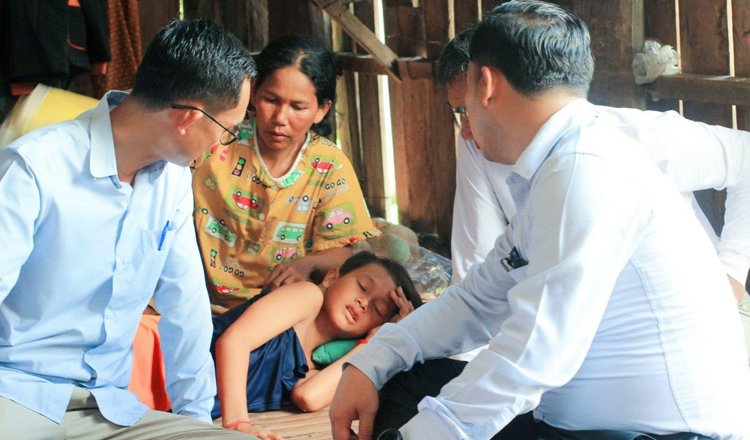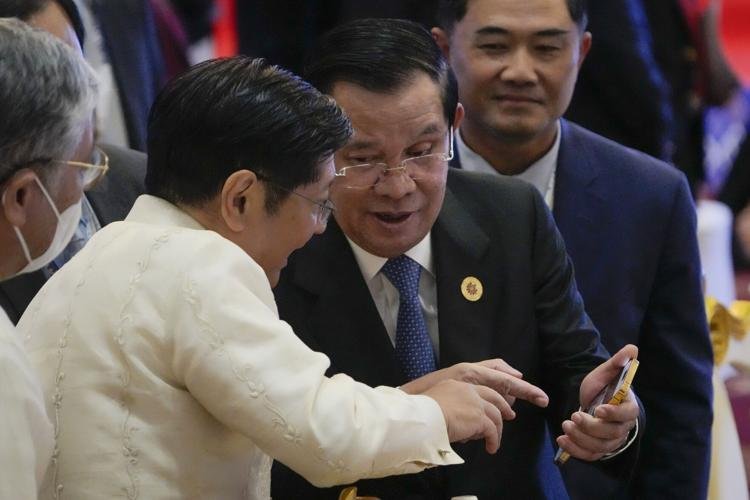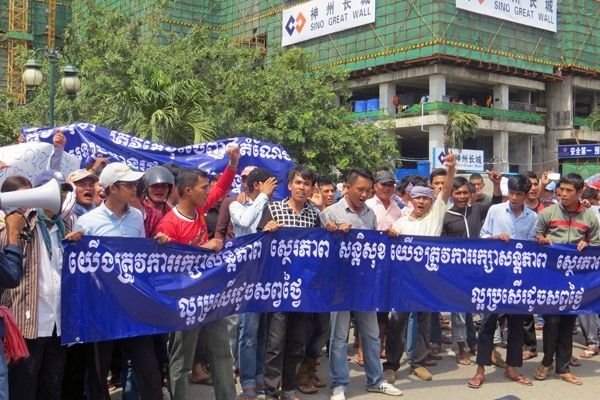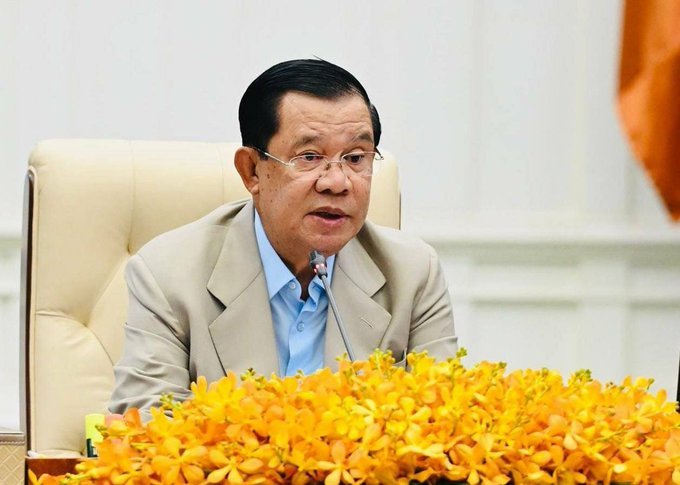-
Posts
15,576 -
Joined
-
Last visited
Content Type
Events
Forums
Downloads
Quizzes
Gallery
Blogs
Everything posted by geovalin
-
The adult children of Cambodia’s aging ruling elite are preparing to take over the government. Prime Minister Hun Sen had been grooming him for years. And in December 2021, he finally declared that his eldest son – the foreign-educated military general, Hun Manet – would one day succeed him as Cambodia’s next prime minister. “Who would dare to oppose this? Hun Sen will die someday, so why not let his son take over?” he asked at a public event in Sihanoukville. This week, the prime minister said the transfer of power could become a reality as soon as next month. But the prime minister’s son isn’t the only heir poised to take on power from an aging generation of political elites. They appear ready to hand over the government to a new generation, many of whom are literally their sons and daughters. In April, the prime minister sent a dozen senior government ministry appointments to King Norodom Sihamoni for his approval. Every candidate was related to a top military, government or CPP official. The last parliamentary election in 2018 was widely condemned as neither free nor fair after the Supreme Court ordered that the main opposition party at the time, the Cambodia National Rescue Party, be disbanded. Duong Chantra, a senior CNRP official who now lives in Thailand, said the CPP’s nepotistic practices aren’t fair to ambitious and capable young Cambodians who don’t have powerful relatives. “We don’t want to see them practice such dynastic power transfer,” he said. “It creates disappointment and hopelessness for the younger generations who are not from that kind of lineage.” The CPP is preparing to welcome members of the new generation into the prime minister’s cabinet after the election, CPP spokesman Sok Ey San told Radio Free Asia this week. In an earlier interview, he told RFA that the party that wins elections has the right to appoint who they want. “Are there any countries in the world that employ the children of opposition party officials?” he asked. “For our ruling party, we appoint and promote people from our own party.” https://www.rfa.org/english/news/cambodia/election-nepotism-07202023165821.html Copyright © 1998-2020, RFA. Used with the permission of Radio Free Asia, 2025 M St. NW, Suite 300, Washington DC 20036.
-
By Jonathan Head, Lulu Luo & Frances Mao BBC News in Phnom Penh and Singapore Voting is underway in Cambodia, where the country's long-term leader is virtually certain to extend his party's rule in an election where there are no serious challengers. People turning up to the polls in Phnom Penh told the BBC they expected the Cambodian People's Party (CPP) to sweep all 125 seats in parliament again. Hun Sen, who has been in power for 38 years, faces no real challenge after the only credible opposition party was disqualified in May. Critics have called the vote a sham. "The election this year is not free nor fair, because the choice of two million people was taken away," one voter in Phnom Penh told the BBC. Western nations, including the US, have also expressed concerns about the integrity of the vote. To ensure the highest possible turnout when people are being offered no real choice, the government has criminalised any attempt to boycott the election or spoil the ballot papers. Opposition lawmakers this year have reported violent attacks, with Human Rights Watch reporting the government stepped up intimidation and arbitrary arrests of political opposition in the run-up to the poll. In May, the government barred the country's main opposition party, the Candlelight Party, on a technicality. The National Election Commission said the party was missing paperwork, which it had not needed for the local elections last year. read more https://www.bbc.com/news/world-asia-66264726
-
A look at the political parties listed on the July 23 ballot. Eighteen political parties will compete in Cambodia’s parliamentary election on July 23 – the country’s seventh national vote since the United Nations organized and ran the 1993 election two years after the Paris Peace Agreements. The National Election Committee in May ruled that two parties – the main opposition Candlelight Party and the Khmer United Great Nation Party – could not appear on the ballot, citing inadequate paperwork. The Candlelight Party is widely believed to be the only party that could have mounted a serious challenge to Prime Minister Hun Sen’s Cambodian People’s Party, but its exclusion means the ruling CPP is expected to win the large majority – and possibly all – of the National Assembly’s 125 seats. Even if it doesn’t, most of the other parties are deferential to the CPP and Hun Sen. Many officials from the smaller parties have been appointed to the Supreme Consultative Council, an advisory body created by Hun Sen following the 2018 election to bolster his power with the appearance of multi-party support. Here’s a look at every party on the ballot. _ Beehive Social Democratic Party: Radio station owner Mam Sonando founded the party in 2016. He had been a vocal critic of Hun Sen’s government, and his independent Beehive Radio station was once described by Human Rights Watch as “a key platform for promotion of human rights and democracy.” But after the 2018 election, the prime minister appointed Mam Sonando to the Supreme Consultative Council. Since then, the Beehive Party has repeatedly come out in support of the government. _ Cambodia Indigenous Peoples Democracy Party: The party was formed in early 2017 and is headquartered in Mondulkiri province. The president is Blang Sin, an ethnic Pnong who has participated in the Supreme Consultative Council. The party has not had an active campaign presence. _ Cambodian Nationality Party: Chaired by Seng Sokheng and first registered as a party with the Ministry of Interior in 2011, the party supports Hun Sen’s leadership and attacks opposition activists. It also participates in the Supreme Consultative Council, a body Hun Sen created. _ Cambodian People’s Party: Originally known as the Kampuchean People’s Revolutionary Party, it was formed in 1951 as part of Ho Chi Minh’s Indochina Communist Party. Hun Sen is its president and has been in power in government since 1985. The party has listed his eldest son, Hun Manet, as a National Assembly candidate in Phnom Penh. Hun Sen has said that he wants Hun Manet to eventually succeed him as prime minister – a transition that could happen soon after the election. _ Cambodian Youth Party: The party was founded in 2015 by Pich Sros, a former garment worker. Along with Funcinpec, it filed a complaint in 2017 against the Cambodia National Rescue Party – then the country’s main opposition party – that led to that party’s dissolution. After the 2018 general election, Pich Sros was promoted to the rank of senior minister when he agreed to participate in the Supreme Consultative Council. He has been active in criticizing the opposition. _ Democracy Power Party: Formed in 2020 by Un Visethkun, the former vice president of the Cambodian Youth Party. The party praised and supported Hun Sen’s policies. In February, the party issued a statement supporting the government’s decision to revoke the license of independent media outlet Voice of Democracy. _ Dharmacracy Party: Formed in 1998, party officials did not take any action until 2017. After the CNRP was dissolved, the party participated in the 2018 general election. Its president, Por Tey Savathy, and her husband, vice president Tan Chanphal, have been appointed to the Supreme Consultative Council. The party follows Hun Sen’s political line. _ Ekpheap Cheat Khmer Party: The party announced in 2022 that it had expelled its vice president, Un Chim – a former Buddhist monk from California – following accusations that he faked a voice message from Hun Sen. The acting president of the party at the time, Lak Sopheap, told reporters in January 2022 that the fake message was sent to party members in Cambodia and the U.S. as a way of attacking her and other party leaders. The contents of the message have not been revealed to reporters. The Ministry of Interior later recognized Un Chim as the party’s new president. In February 2022, Un Chim expelled Lak Sopheap and another top official. _ Farmer’s Party: Established in 1988. The president is Meas Bo Pov, a former CPP member who has been connected to a number of public land disputes. The party follows Hun Sen’s political line. In May, it published a statement supporting the NEC’s decision to disallow the Candlelight Party from the election. _ Funcinpec: Formed in March 1981 as a resistance movement to the Vietnam-backed regime of the 1980s. It signed the 1991 Paris Peace Agreements and formed a coalition government with the CPP after the 1993 election. Internal conflicts and Hun Sen’s separatist strategy have weakened the party over the years. Nhek Bun Chhay of the Khmer National United Party was the party’s secretary-general from 2006-2015. The current president is Prince Norodom Chakravuth, the grandson of the late King Norodom Sihanouk and the eldest son of the late Prince Norodom Ranariddh, who served as co-prime minister from 1993-1997. Most voters no longer associate Funcinpec with the country’s royalist past, especially after Ranariddh’s decisions at various times over the years to align with the CPP. _ Grassroots Democratic Party: Formed in 2015 by a group of senior intellectuals, leaders and members of civil society. It’s led by Yeng Virak, former president of the Community Legal Education Center, a Phnom Penh NGO that works on land issues. While some senior party officials have recently left to join the government, the party continues to criticize alleged violations of law and human rights committed by Hun Sen’s government, including the recent passage of an election law amendment that prohibits those who don’t vote in this month’s elections from running for office in the future. _ Khmer Anti-Poverty Party: Led by Kravanh Daron, a Cambodian-American who worked as a social worker in the United States for 25 years. The party was registered by the Ministry of Interior in 2007. It declared non-recognition of the 2018 election results, citing the Supreme Court’s ban on the main opposition party at the time, the Cambodia National Rescue Party (CNRP). Khmer Anti-Poverty Party officials have not participated in the Supreme Consultative Council. But last year, the Khmer Overseas Facebook page leaked several photos of Kravanh Daron posing with Hun Sen and Hun Manet. It’s unclear how close Kravanh Daron is with the prime minister and his son. _ Khmer Conservative Party: The party was registered with the Ministry of Interior in 2019. It is led by former CNRP lawmaker Riel Khemrin. _ Khmer Economic Development Party: Headed by Huon Chanthon. Party officials have joined the Supreme Consultative Council and have issued a series of statements in support of Hun Sen’s policies. Last month, the party released a congratulatory letter to the CPP on the anniversary of its founding. _ Khmer National United Party: Formed in 2016, its president is Nhek Bun Chhay, a prominent Cambodian political figure and a former senior Funcinpec official. The party did not win a seat in the 2018 election, but Nhek Bun Chhay was given the same rank as a senior minister by participating on the Supreme Consultative Council. At the end of 2022, the Kampuchea Niyum Party, run by former CNRP lawmaker Yem Ponharith, announced its intention to join the Khmer United National Party for the 2023 election. _ Khmer United Party: Established in 2018 by Kem Rithisit, the younger brother of Kem Ley, a political commentator and social activist who was gunned down in Phnom Penh in 2016. Kem Rithisit joined the Supreme Consultative Council after the 2018 election. He resigned as party president at the end of 2020 but remains with the party as an honorary president. The Khmer United Party follows Hun Sen’s political line. _ People Purpose Party: Led by Ith Sarm, a former vice president of the League for Democracy Party (LDP), which won a few seats in the 2012 commune election and also participated in the 2013 general election but is not participating in this election. The LDP didn’t contest the 2022 commune elections, citing threats against its members and a disagreement with the NEC over how votes are validated at polling stations. The party has not explained why it’s not contesting this year’s election. Ith Sarm is active on Facebook, where he discusses social and political issues as well as broadcast news programs. But since its inception in 2019, the People Purpose Party has done little to no work at building a grassroots presence. _ Women for Women Party: Established in 2019. The party’s president is Soeung Sothy, a businesswoman in the tourism industry. It has only until recently become politically active. https://www.rfa.org/english/news/cambodia/election-parties-07212023125117.html Copyright © 1998-2020, RFA. Used with the permission of Radio Free Asia, 2025 M St. NW, Suite 300, Washington DC 20036.
-
- 1
-

-
‘I don’t believe there is anything in the Cambodian water that is hostile to democracy.’ Radio Free Asia spoke with former Australian Foreign Minister Gareth Evans on Wednesday, ahead of Sunday’s parliamentary election in Cambodia. Evans is the architect of the 1991 Paris Peace Accord, which ended war in Cambodia and promised democratic freedoms and human rights. It led to the 1993 U.N.-sponsored election that was contested by multiple political parties. Thirty years later, Prime Minister Hun Sen’s relentless campaign to co-opt dissenting voices and effectively ban the main opposition Candlelight Party from participating in this year’s vote has been a “shameless, disgraceful, indefensible” development, Evans said. The response from the international community should lie in applying serious, systematic targeted sanctions against current Cambodian leaders and ruling elites, he said. As for opposition activists, Evans suggests to “keep the flame alive and wait for the times and circumstances to change.” Members of the Constitutional Council of Cambodia announce the disqualification of the Candlelight Party from the upcoming election in Phnom Penh, Cambodia, May 25, 2023. Credit: Cindy Liu/Reuters RFA: Cambodia will have an election next Sunday. And as you know, just a few weeks before the election, Hun Sen amended the election law banning those who fail to cast their ballot from running for office in the future. We want to hear your view on that. Gareth Evans: Well, obviously, the recent electoral law changes are shameless, disgraceful, indefensible. It’s obviously designed to avoid any opportunity for a boycott. Not that boycotts have been very successful in the past, but it’s entirely consistent with the increasingly autocratic character of the Hun Sen regime. We’ve seen this. We’ve seen this play out so many times before in so many different ways. This is just the latest version of it, a complete crackdown on anything resembling decency, anything resembling decent democracy. It’s a very, very unhappy development, but something that I’m afraid we’ve become used to. RFA: Even though there are 18 political parties contesting the election, the main, credible opposition party, the Candlelight Party, has been banned by the National Election Committee, saying that it had failed to provide an original registration document. But as you know, this is an attempt from Prime Minister Hun Sen’s party, the CPP, to eliminate any possible opposition party in the election. Gareth Evans: Yes, we’ve seen this play before with the banning of the Cambodia National Rescue Party (in 2017). We’ve seen it with the criminal proceedings against Sam Rainsy. We’ve seen it with the criminal proceedings against Kem Sokha, and we’ve seen it now, of course, with the banning of the Candlelight Party. So, although notionally we have, as you say, a lot of small parties still contesting the election, the reality is that the only serious opposition to the CPP was the major parties of the major players, the major spokesmen, and they have been completely suppressed now by these measures. Again, I say with the rest of the world, this is shameless. This is disgraceful. This is indefensible. And it’s just a fundamental assault on democracy. And I can’t understand anyone who cannot be very, very unhappy about that, particularly given the whole history of Cambodia and the efforts that we went to at the time of the peace settlement, the Paris Peace Accords, to entrench democracy and human rights in the Cambodian constitution and the Cambodian system. So it’s unfortunately been a very unhappy story ever since. Australian Foreign Minister Gareth Evans signs the 1991 Paris Peace Accord that ended the war in Cambodia. Credit: Eric Feferberg/AFP RFA: Even though this is an unhappy story, Hun Sen survives all the time. He lost the 1993 election. He managed to hold onto power as the second prime minister, and then he conducted a coup (in 1997) and chased out the first prime minister. As you know, five years ago he banned the CNRP from contesting the election. He won that election. The whole world refused to accept the election result as soon as the result was announced. But then the world has to work with him. Is it enough for the international community just to not accept the result of this sham election? Gareth Evans: No. I think the international community has to do more. In fact, when I think back on it, I mean, the real trouble started back in 1993 with that first election result, which was a demonstration of how much the Cambodian people really wanted democracy, really wanted to have a say in how they governed. But of course, Hun Sen refused to accept the election result then. We went along with his objections and allowed him to become the second prime minister. And the rest is history. So we’ve performed very badly as an international community all these years. And I think the solution is not in the multilateral organizations. I mean, people talk about reconvening the Paris International Conference and somehow, you know, getting the terms of the agreement re-enforced. But the most that could happen if that were to take place, would be simply to refer the issue back to the competent UN organs, back to the Human Rights Council. So we would just go around and around in circles, as you say, making occasional statements, occasional resolutions of international bodies, but nothing really happening. So, I think the solution lies essentially with individual countries, not so much the multilateral intergovernmental organizations, not the UN itself, not the Human Rights Council. I think it depends on individual countries applying quite serious sanctions. A member of Cambodia’s Grassroots Democratic Party distributes political campaign leaflets in Phnom Penh, July 4, 2023. Credit: Tang Chhin Sothy/AFP RFA: What would be your advice to opposition leaders and to the Cambodian people in general? How much longer can they continue to fight? And what would be your advice so that the effort can be sustainable? Gareth Evans: Well, of course, that’s the situation at the moment. It’s very bleak, It’s very desolate and it’s very dangerous for opponents of the regime internally. And it’s difficult for me sitting comfortably in Australia to be telling, you know, people who are unhappy with the situation in Cambodia what to do. But all I can say is you just have to keep that flame alive. You have to keep that flame burning and wait for the times and circumstances to change. I don’t believe there is anything in the Cambodian water that is hostile to democracy, that’s in favor of authoritarianism, that’s in favor of paternalism. I saw for myself in 1993 how badly how badly the people of Cambodia wanted a say in their own government, wanted a return to normality and decency. That spirit is there, and it just has to be quietly nurtured, supported by overseas countries like Australia and the United States, helping at the margins. Optimism is self-reinforcing. Pessimism is very self-defeating. And unless you believe the change can happen and will happen over time, then the change is never going to happen. You just have to go on believing in it and staying committed. And I know there are a great many decent Cambodians doing just that at the moment, and I wish them every possible success. https://www.rfa.org/english/news/cambodia/gareth-evans-interview-07222023121238.html Copyright © 1998-2020, RFA. Used with the permission of Radio Free Asia, 2025 M St. NW, Suite 300, Washington DC 20036.
-
PHNOM PENH, cambodia — As Hun Manet, eldest son of longtime Prime Minister Hun Sen, wrapped up the ruling Cambodian People’s Party’s (CPP) campaign on Friday, his father hinted that his son, a West Point graduate, could become the prime minister just after Sunday’s unopposed election. In a video interview with China’s Phoenix TV, which was released Thursday, the prime minister said there were two leading candidates for the ruling party — himself and Hun Manet. “It is also possible that in just three or four weeks, Hun Manet can become the prime minister. Let’s see what other people say,” said Hun Sen, who has been in power for 38 years and turns 71 next month. “I believe that Manet is more competent than me,” he told Phoenix TV. “He will serve the people better than me. “I am the one who makes the biggest sacrifice. Right now, I have an absolute power, but in about a month, I won't have the power to sign any bills the same way as I do today,” said Hun Sen, who is drawing closer to China. He added that the changeover was under consideration “not for my son” but because his family needs to continue to maintain peace in the Southeast Asian country. Hun Manet has long been seen as his father’s successor, but Hun Sen’s comments to Phoenix TV marked the first time a timeline had been attached to the transfer of power. In 2021, Hun Sen had said, “I am still standing, so what’s the point of my son being the prime minister? … His possible [premiership] is not before 2028. It is more likely to take place between 2028 and even 2030. He must wait.” Hun Manet is a 1998 graduate of the U.S. Military Academy at West Point. He also completed graduate work in economics, earning a master's degree from New York University in 2002 and a doctorate from the University of Bristol in 2008. In Sunday’s election, Hun Manet is standing as the lawmaker candidate on the top list of seats for Phnom Penh. To become a premier, the candidate has to be an elected lawmaker among the total of 125. Ruling CPP spokesperson Sok Eysan said Hun Manet’s prospects for the top office were good. "The percentage of the possibility [that Hun Manet will become PM] is high,” he said. Accusations against Hun Sen In June, Hun Sen said the government would be formed on August 31, just weeks after the election. Human rights groups have dismissed the election as a sham and accuse Hun Sen of controlling the media, threatening critics and systematically dismantling his opposition using trumped-up criminal charges. Hun Manet now serves as a commander in chief of the Royal Cambodian Army. The four-star general is also the deputy commander-in-chief of the Royal Cambodian Armed Forces. Hun Sen had long positioned his eldest son to be his successor, but political analysts and observers have only been able to speculate about when and how he would hand over power — and if indeed it would be handed to Hun Manet. “This is the closest we’ve had yet to a definitive public confirmation about the timing of the handover of power,” journalist Sebastian Strangio, author of Hun Sen’s Cambodia, posted on Twitter on Friday. Cambodia’s National Election Committee (NEC) disqualified the main opposition Candlelight Party from competing in the July national election, citing lack of paperwork. The decision has been criticized by international communities, and the appeal to the NEC failed in May. FILE - Cambodian Prime Minister Hun Sen salutes, along with his son, Lt. Gen. Hun Manet, during an inspection of troops at a ceremony in Phnom Penh, Cambodia, Jan. 24, 2019. Ou Virak, president of Future Forum, a think tank in Cambodia, said Hun Sen’s announcement was not a surprise. “If Hun Manet becomes a premier after the upcoming election, Cambodia will change politicians from the old generation to the new generation,” he told VOA Khmer. On Friday, the final day of campaigning, Hun Manet, 45, said his party would win by a landslide as he spoke of how the CPP had maintained peace and stability after decades of war. 'He has the wisdom' Ruling party supporter Chin Sophan, 46, told VOA Khmer she believed the CPP would win. She wants Hun Manet to be the leader because she was pleased with his father’s rule. "So, I am very satisfied because he has the wisdom to rule our country well," she said, adding “it’s the time that there is no war and no opposition.” Phoeun Mealeadey, 19, a college freshman majoring in banking, said she thought Hun Manet would be a capable prime minister "because he has knowledge, he has highest education.” Hun Manet recently told hundreds of supporters: "Democratic elections are based on the law. Whatever the CPP does, [it] is doing [it] legally. This is fair and just competition and transparency, which is based on the law. Effective democracy is based on the rule of law. This is what the CPP will try to win.” https://www.voanews.com/a/cambodia-s-longtime-ruler-hun-sen-says-son-can-become-pm-in-3-4-weeks/7190511.html
-
Cambodian leader Hun Sen’s eldest son and chosen successor hailed “victory day” in a final rambunctious rally Friday, ahead of one-sided elections that his father’s ruling party is guaranteed to win. One of the world’s longest-serving rulers, Hun Sen has played off tensions between the United States and China to buttress his grip on power, although critics say that more than 30 years after UN-brokered peace accords ended decades of bloody conflict, Cambodian democracy is in a sorry state. A crowd of tens of thousands of supporters on motorbikes, dressed in bright blue, gathered under grey skies in the early morning to hear Hun Manet’s speech before he roared off in a huge celebratory motorcade parade around the capital Phnom Penh. It was the final rally before Sunday’s election, which has seen all meaningful opposition either disqualified or exiled, leaving voters no choice but to hand Hun Sen’s Cambodian People’s Party (CPP) a majority in the 125-member parliament. “Today is a victory day for us,” Hun Manet said under a giant poster of his father, urging supporters to vote for the ruling party. “Only the CPP has the ability to lead Cambodia.” read more https://www.thaipbsworld.com/victory-day-cambodia-heir-leads-final-rally-ahead-of-one-sided-election/
-
The French School of Asian Studies or The École française d’Extrême-Orient (EFEO), in partnership with the APSARA National Authority for conservation and research work at the Angkor site, on July 20, handed over 31 boxes of artefact fragments including one Buddha statue, and one Bai Sema to the APSARA National Authority for preservation, research, and inventory. Tin Tina, Deputy Director of the Department of Research, Training, and Communication, said that all the artefacts donated by the EFEO to the APSARA National Authority were found by excavation at some research sites in Angkor, such as Kouk Ta Siem, Boeung Don Pa, Ung Mong, Baphuon and Prey Moni. He added that these items include, firstly, 27 boxes of ceramics from the Baphuon temple, including hard pottery, fragile pottery belonging to Khmer as well as Chinese, Siamese, and Vietnamese ceramics. Second, two boxes of sandstone pieces from Kok Ta Siam. Third, there are two boxes of sandstone pieces from Boeung Don Pa, Kork Ta Siam, and the Ung Mong temple. read more https://www.khmertimeskh.com/501327654/french-school-of-asian-studies-donates-artefacts-to-apsara-national-authority/
-
Hun Sen’s economic achievements are unraveling and everyone’s getting hit. It called itself “a nightclub that takes the Phnom Penh nightlife scene to the next level.” It was part-owned by the nephew of a well-connected tycoon, and according to its website, was only for “the most refined clubbers, A-list celebs, and social jet-setters.” A plate of french fries cost US$6. But in early July, Epic quietly shut down – a sign of the times for Cambodia’s financially strained upper crust. Patrons looking to cut costs switched from bottle service to beer, according to a Cambodian businessperson with knowledge of the situation. The eight-year-old hotspot in the heart of Phnom Penh had little choice but to close its doors. “Don’t believe what you see, the luxury cars, mansions, and guards. They’re full of loans,” the businessperson, who asked not to be named for safety reasons, told RFA. The wealthy are now finding themselves having to “urgently sell their property at half market price or lower,” the person added. It’s not just the wealthy feeling the strain. As Cambodians head to the polls on July 23, a cloud hangs over the nation’s usually robust economy. Tourism, which in 2017 was estimated to represent a third of Cambodia’s GDP, was down 33% the first quarter of the year against the same period in 2019. The garment sector, which last year employed 750,000 people but accounted for another third of Cambodia’s GDP, is equally struggling, with 50,000 garment workers unemployed as of March this year. But it’s in real estate and construction, a bellwether of prosperity in this rapidly developing nation, where the full measure of economic problems can be seen. These problems touch every sector of society from the richest down to the poorest and are leaving banks holding a worrying amount of outstanding loans – a possible precursor to financial crisis, according to the World Bank. Nonperforming loans are on the rise, suburban residents are being evicted for missed mortgage payments, and construction has plateaued to such an extent that even what experts have called “enslaved” workers are being laid off. Having outlawed the only viable opposition party, the premier and his ruling Cambodian People’s Party are guaranteed an electoral sweep come Sunday. But with an economic malaise settling over the country, a government that long defended its legitimacy by pointing to rapid GDP growth likely has a rocky road ahead. People buy street food at a tourist site at the Oudong mountain in Kandal province, Cambodia, March 26, 2023. Tourism in Cambodia was down 33% in the first quarter of the year compared to the first quarter of 2019. Credit: Tang Chhin Sothy/AFP Foreclosures mounting Weeks before Epic shut down, with the election looming, Hun Sen set out to ensure middle class homeowners could keep a roof over their heads. In early June, the prime minister ordered developers of semi-gated communities known as boreys to stop evicting homeowners amid a wave of nonpayments. For Cambodians like Pot Srey Pov, a vendor who recently lost her home in Phnom Penh’s Borey Thmey, her US$1000 a month mortgage was too much to bear. After paying nearly half of her mortgage off over the course of three years, she was denied a refinancing that would have helped her keep her home. “Since I bought the house, I never took holidays or took the kids out," she said. The evictions are a sign of the mass problem of household debt that has gripped every level of Cambodian society. The average ratio of household debt to household expenditure in Cambodia stood at 65% in 2019 – “exceptionally high” for a country at Cambodia’s stage of development, according to a recent World Bank report. The report cautioned that the debt is not being productively used; that is, it is not generating income that could be used to repay it. This is “raising concern that excessive borrowing can force households to fall into a vicious debt trap.” Outstanding loans, meanwhile, have ballooned from just 9.6% of GDP in 2009 to 180% in January 2023. The report noted that a large body of research “views rapid credit expansion as a prelude to financial crises.” The government asked developers to allow loan refinancing, and so should take strict measures against companies that continue to confiscate homes, said Yong Kim Eng, president of rights NGO PDP-Center. But it would likely have to give some incentives to the companies, which are also struggling financially. “Some companies are losing money as well, they might face bankruptcy,” he said. Motorists ride past a building under construction in Phnom Penh, June 5, 2023. Some developers who loaded up on loans to build low-grade condos have been forced to stop work. Credit: Tang Chhin Sothy/AFP Developers struggling Shielding borey residents from eviction not only curries favor with CPP rank and file, it cannily outsources the financial burden of addressing a symptom of the unfolding economic crisis onto property developers. Whether developers can shoulder the burden remains to be seen. Real estate and construction sectors accounted for some 15% of the Cambodian economy as of January 2023. But a rapid cooling of a market has been deeply affected by the COVID-19 pandemic – and may never recover to its previous highs. “The market pre-Covid was super-hot, it was like a gold rush. It didn’t really matter what people built, they seemed to be able to sell it,” Tom O’Sullivan, who runs a Cambodian real estate listing website, told RFA. For years before the pandemic, the market had been propped up by Chinese buyers seeking a safe haven for their money. In 2016, the Chinese yuan plummeted 7% against the dollar. In response, Cambodian property developers rapidly built towers full of condos that Chinese investors, seeking to escape the volatility of the yuan currency fluctuation, eagerly snapped up. Often, they paid cash for properties they had never set foot in. Two events in rapid succession pricked Cambodia’s real estate bubble. In August 2019, Prime Minister Hun Sen announced a ban on online casinos. China-facing gaming websites operating primarily out of Cambodia’s largest port city, Sihanoukville, had been the driving force for US$5.8 billion of approved construction projects in 2019-2020, according to the World Bank. Overnight, the industry underpinning the city’s economy disappeared. Then came Covid. Beijing’s response to the pandemic in 2020 – driving up exports and drastically reducing international travel – curbed investors’ desire and ability to offshore their money. The result has been dire for Cambodian real estate. Approvals for construction by the Ministry of Land Management in 2022 were down by nearly half compared to the previous year, from US$5.3 billion to US$2.97 billion. Even when travel restrictions were removed, China’s struggling economy appears to have cut into the purchasing power of would-be investors. “There’s been a decrease in demand,” O’Sullivan said. “Chinese buyers haven’t rebounded like everyone thought they would.” New buildings stand at a construction site in Chinatown in Sihanoukville, Cambodia, Feb. 27, 2020. Before COVID-19, gaming websites operating primarily out of Sihanoukville, had been the driving force for Cambodia’s construction projects in 2019-2020. Credit: Jorge Silva/Reuters Ripple effects Greeted by a dearth of buyers, developers who had loaded up on loans to build low-grade condos have been forced to stop work, often mid-construction, and will almost certainly default on their debts. Further down the food chain, construction workers, who are largely informally employed migrant workers from the countryside, will be finding themselves out of work in increasingly large numbers. That, in turn, will lead to more non-repayment problems, spreading beyond cities. Some 2.1 million Cambodians have an outstanding debt with a microfinance institution, with an average remaining balance to pay of US$4,476. With many rural families relying on relatives working in the cities to repay their loans, the slowdown in the construction sector will send shockwaves deep into Cambodia’s provinces. The situation is so stark that even brick kiln workers – who are among the poorest of the poor and are typically held in bonded labor – are finding themselves out of a job. With so little construction happening, those making the raw materials have either been temporarily released until the kiln resumes work or permanently released from their contract and the kiln shut down, according to Laurie Parsons, a lecturer at London’s Royal Holloway University who studies enslaved laborers. Those laborers who have been retained in their bonds, forced to undertake the dangerous, back-breaking work until their debts are paid off, are now given work only sporadically, placing them in an even more precarious situation. Traffic moves through downtown Phnom Penh, Cambodia, March 3, 2023. Some 2.1 million Cambodians are in debt to a microfinance institution. Credit: Heng Sinith/AP Lenders wary For banks, the shifting economic headwinds have led to a slowdown in lending. In January and February, lending by Cambodian banks shrunk, according to National Bank of Cambodia data. That has never happened for two consecutive months at any point in the last decade. CPP spokesperson Sok Ey San insisted that the dip in lending suggests financial improvement. “People don’t need cash because they are getting better financially, so they don’t need bank loans or microfinance loans,” he told RFA. But analysts and business insiders say the slowdown suggests banks are wary of lending amid economic uncertainty and rising levels of non-performing loans, those on which the debtors have failed to make repayments for 90 days or more. National Bank of Cambodia data show non-performing loans, which includes everything from business loans to mortgages, credit cards and overdrafts, almost doubled from US$700 million in 2021 to US$1.3 billion by the end of 2022, accounting for 3% of all credit extended by banks. “The banks stopped loaning money, it’s on a real decline now,” the Cambodian businessperson told RFA. No easy out While many Cambodians have long struggled to get by, those in the middle and upper classes have traditionally been shielded from precarity. Cambodia has also avoided the pandemic-related inflation that has imperiled neighboring Laos. But with the wealthy, developers and homeowners all struggling amid debt, with banks holding more nonperforming loans than ever, the government faces a challenge going forward. Not least with regard to the 37% of the population estimated by the United Nations to be either suffering from or at risk of what it terms “multidimensional poverty.” For more than three decades the CPP has sold itself to voters, its neighbors and the international community as the guarantor of both political and economic stability in Cambodia. Political continuity looks assured through the planned transfer of power from Prime Minister Hun Sen to his son Hun Manet, who happens to hold a PhD in economics. He will have to navigate a set of economic challenges unlike any his father ever dealt with. Additional reporting by RFA Khmer. https://www.rfa.org/english/news/cambodia/cambodia-economy-election-07202023095432.html Copyright © 1998-2020, RFA. Used with the permission of Radio Free Asia, 2025 M St. NW, Suite 300, Washington DC 20036.
-
More than a thousand Cambodian workers have spent the last three years trying to get their full severance pay after their apparel factory closed. Nike, the global sports giant whose goods were being produced, says the factory was an unauthorized supplier. Today, over 50 organizations, including Human Rights Watch, have petitioned Nike to resolve the prolonged struggle of 1,280 workers from Cambodia’s Violet Apparel factory, operated by the Ramatex Group. A new report by the Worker Rights Consortium estimates that Ramatex – which closed the factory in June 2020 – owes these workers about US$1.4 million in total. The Worker Rights Consortium also found that the Ramatex Group, a conglomerate with numerous factories in Cambodia and other countries in Southeast Asia, continues to produce for Nike, one of its main business partners. The Ramatex Group dismissed the workers’ claims, citing a letter from Cambodia’s labor ministry. The labor ministry’s letter said that those parts of the labor law that require employers to pay “compensation in lieu of prior notice” would not have to be implemented. This argument is not only legally flawed, but if it became the norm in Cambodia, would allow foreign and domestic corporations and government ministries to pick and choose which legal provisions to abide by. Cambodia’s Arbitration Council, the country’s labor dispute resolution body, refused to rule on the workers’ claims, saying the council lacked jurisdiction. This ruling was unsurprising. Industry associations and companies doing business in Cambodia, including Nike, have long expressed concerns about the council’s independence. Increasingly, the council appears beholden to Prime Minister Hun Sen’s ruling Cambodian People’s Party. The Ramatex Group did not respond to Human Rights Watch’s requests for comment about the workers’ plight. Nike told us that Ramatex’s Violet Apparel factory was not authorized to produce their branded goods. Unauthorized subcontracting is a major human rights risk in the global supply chains of global companies. Dealing with the messy problems isn’t easy. But companies should support workers affected by unauthorized subcontracting and factory closures when they produce their goods. Nike should make sure that Ramatex Group’s Violet Apparel factory workers who made their products get paid what they are owed. Companies should not expect workers of unauthorized suppliers to shoulder the burden of their risks. https://www.hrw.org/news/2023/07/20/nike-should-help-cambodian-workers-hurt-factory-closure
-
Cambodian Prime Minister Hun Sen's Facebook account has been reactivated, three weeks after he announced he was forsaking the social media giant in favor of posting on the Telegram messaging app PHNOM PENH, Cambodia -- Cambodian Prime Minister Hun Sen's Facebook account was reactivated Thursday, three weeks after he announced he was forsaking the social media giant in favor of posting on Telegram, a popular messaging app that also serves as a blogging tool. Hun Sen’s return to the Facebook fold came three days before a general election in which his ruling Cambodian People’s Party is virtually guaranteed a landslide victory. Hun Sen said at the end of June that he would stop posting new material on his Facebook page but leave the account online. He said he was switching to Telegram because he believed the app provided a more effective way to communicate. But when a Facebook watchdog criticized the language in one of his videos and recommended suspending the prime minister's account for six months, Hun Sen took down the page. Duong Dara, who manages the 70-year-old leader's social media accounts, posted a message Thursday saying he had asked Hun Sen to be allowed to reactivate his Facebook page in the national interest. He said he, and not the prime minister, would be uploading content. read more https://abcnews.go.com/Technology/wireStory/cambodias-leader-returns-facebook-weeks-after-acrimonious-breakup-101519256
-
The director of the Stung Treng Provincial Department of Tourism, Un Po Soeun, led his subordinates to continue to disseminate the circular to the people and owners of karaoke restaurants and entertainment clubs to suspend the sale of alcohol one day before election day and on election day. Po Soeun said that in accordance with the directive from the Ministry of Tourism, he assigned Vorn Tum to lead the officers to carry out the ban on the sale of alcohol everywhere in Stung Treng, especially in karaoke restaurants, entertainment clubs and so on. The director of the department said that the ban one day before and on the day of the election is aimed at requiring employees in each place to take time off work to go to the polls. During the visit, the owners of all liquor stores in Stung Treng Province promised and implemented the circular of the Ministry of Tourism, as well as direct instructions from the Stung Treng Provincial Department of Tourism. The 7th National Assembly Election 2023 will be held on July 23, 2023. According to the circular of the Ministry of Tourism, the sale and consumption of alcohol must be suspended one day before the election day and the other day on the election day. Kampuchea Thmey read more https://www.khmertimeskh.com/501326118/authorities-instruct-restaurant-and-entertainment-owners-to-suspend-beer-sales-during-elections/
-
The Preah Sihanouk provincial authority transported 708 domestic and international tourists from the islands due to forecasted adverse weather conditions yesterday. Kuoch Chamroeun, Preah Sihanouk Provincial Governor, yesterday ordered Major General Chuon Narin, the Provincial Police Chief and the relevant authorities to send five large ships to transport tourists from the islands. Although the sea conditions are currently calm, the authorities want to prevent any possible risk to tourists, as weather conditions are expected to worsen in the coming days and they want to get all the tourists back to the mainland. Due to heavy rain, strong winds and high waves forecasted, the authorities have decided to temporarily suspend tourism on the islands until the situation improves. Long Dimanche, Preah Sihanouk deputy governor, said that the authorities sent five ships to transport tourists back from Koh Rong and Koh Rong Sanloem islands. Some tourists did not want to leave, but the authorities informed them that the weather conditions are expected to worsen in the coming days and it was for their safety. read more https://www.khmertimeskh.com/501325560/over-700-tourists-transported-to-mainland-as-weather-worsens/
-
Tributes have been paid to a well-known Australian hotelier, Richard Pobitzer, who died in a motorcycle accident last week in central Phnom Penh Mr Pobitzer – the Executive Assistant to General Manager of the Sun & Moon Hotel – was seriously injured when the moto he was driving was hit by a white Alphard car, driven by another foreigner, on the 13th of July along Preah Suramarit Road, Chaktomuk Sangkat, Daun Penh District, Phnom Penh Witnesses say that the Alphard was seen driving carelessly at high speeds when it hit Mr Pobitzer. In the ensuing crash, the victim was dragged for several metres along the road. Mr Pobitzer was rushed to hospital – but died later in of his injuries, with work colleagues holding a vigil by his bedside The Alphard driver was detained by the police and taken to the Chaktomuk Sangkat Administrative Police Station for further questioning, although it is unclear as to whether he was charged with any crime. Mr Pobitzer, who had worked in hospitality in Australia for 20 years before coming to Cambodia, was a well-known and well liked member of the capital’s expat community. Mr Pobitzer’s family are understood to be in Cambodia to take care of funeral arrangements. read more https://www.khmertimeskh.com/501325496/expats-and-khmers-mourn-popular-australian-hotelier-killed-in-phnom-penh-crash/
-
WASHINGTON — A bipartisan group of U.S. lawmakers are reintroducing a sanctions bill targeting Cambodia’s leaders about a week before the country’s largely preordained national elections. The Cambodia Democracy and Human Rights Act would sanction Cambodian leaders involved in attacks on democracy and human rights abuses, as well as increasing scrutiny of Phnom Penh’s ties to Beijing. Sen. Ed Markey (D-Mass) announced the legislation on Friday, along with Sens. Dick Durbin (D-Ill.) and Marco Rubio (R-Fla.) and Reps. Chris Smith (D-N.J.) and Lori Trahan (D-Mass.). “On the eve of Cambodia’s general election, the Cambodia Democracy and Human Rights Act reaffirms America’s support for free, fair elections and the upholding of democratic values in Cambodia,” said Trahan, who chairs the Congressional Cambodia Caucus. “Prime Minister Hun Sen and his cronies have continued to undermine democracy and violate human rights,” added Markey. “The United States must send a clear message that we will not waver in our commitment to supporting the people of Cambodia and their constitutional right to democracy.” The bill lists three broad categories of sanctionable activities, all of which would result in an individual’s assets being blocked in the United States. It asks the president to submit a list to Congress within 180 days of the bill passing that identifies Cambodians who “directly and substantially prevent” opposition parties, the media or civil society groups from “exercising their civil and political rights.” It also targets individuals who “engage in or are responsible for any acts” that fall under the Global Magnitsky Human Rights Accountability Act, which applies to gross violations of human rights and corruption. In this photo provided by Cambodia's Fresh News, Cambodian Defense Minister Tea Banh, rear center left, and Chinese Ambassador to Cambodia Wang Wentian, rear center right, preside over the groundbreaking ceremony for a shipyard repairing and restoration workshop in Ream Cambodian Naval Base of Sihanoukville, Wednesday, June 8, 2022. (Cambodia's Fresh News via AP) And the bill seeks to sanction those who “engage in or support the establishment of installations or facilities” that could be used by China’s military or affiliated entities. The U.S. has long expressed concern about China’s involvement in construction on and around the Ream naval base on Cambodia’s coast in the Gulf of Thailand. Some military leaders are already under American sanctions over alleged corruption related to the base. Individuals found in violation of the Cambodia Democracy and Human Rights Act would be barred from conducting any financial transactions in the U.S. and would have their visas blocked or revoked. The bill allows exceptions in case of national security interests or international obligations, which may, for example, allow senior officials to attend United Nations summits despite being on the list. Phay Siphan, a Cambodian government spokesman, called the bill “politically motivated” and said the U.S. was “afraid that we are close to China.” “It’s due to confusion among US politicians,” he told VOA Khmer of the legislation, adding it was meant to “create a political scene ahead of the election.” Rubio and Smith specifically cited U.S. concerns over Cambodia’s relationship with China in his statement on the legislation. “Under Hun Sen’s authoritarian grip, Cambodia is being exploited by China’s genocidal regime. This bipartisan and bicameral bill would push for accountability in support of the Cambodian people,” Rubio said. “Our legislation seeks to counter both despotism within the country and the imperialistic ambitions of Xi Jinping’s China,” added Smith. FILE - Cambodian-U.S. human rights advocate Theary Seng, dressed as Lady Liberty, is arrested by police after being found guilty of treason in her trial in front of the Phnom Penh municipal court, June 14, 2022. Durbin also mentioned the case of Theary Seng, a Cambodian-American human rights activist who was jailed last year on incitement charges largely based on her social media posts in support of longtime opposition leader Sam Rainsy. The Senate Foreign Affairs Committee advanced a previous version of the Cambodia Democracy and Human Rights Act shortly after her conviction in June 2022. At the time, Markey’s office told VOA Khmer that he expected the bill to reach President Biden’s desk by the end of the year. However, the bill didn’t receive a floor vote in the previous Congress, meaning it now needs to restart the process in the current Congress. There is little chance that it will move ahead of Cambodia’s election on July 23. Not only has Cambodia’s government ignored calls to restore the political rights of Cambodian opposition leader Kem Sokha ahead of the ballot, the quasi-independent elections body has blocked the main opposition Candlelight Party from participating over clerical issues. The bill would likely roil U.S. relations with Hun Sen’s government as he orchestrates a transfer of power to his son, Gen. Hun Manet, who for the first time is running for parliament in this election. The prime minister has indicated he plans to hand power to his son in the next five years, before 2028 national elections. https://www.voacambodia.com/a/us-lawmakers-reintroduce-sanctions-bill-targeting-cambodia-s-leaders/7185745.html
-
The order comes just days ahead of Sunday’s parliamentary elections. Prime Minister Hun Sen’s government has ordered internet service providers in Cambodia to block the websites of Radio Free Asia and other news outlets ahead of this Sunday’s parliamentary election. The outlets were accused of misrepresenting the government’s reputation and prestige and of failing to meet the Ministry of Information’s conditions for doing business, according to a July 12 letter signed by Srun Kimsan of Telecommunication Regulator of Cambodia. The blocked sites include RFA’s Khmer and English websites and RFA’s Khmer language Twitter page. The regulator also ordered the blocking of the Kamnotra website, produced by the Cambodian Center for Independent Media, or CCIM. The website posts information, data or documents that people can use. RFA condemned the order, calling it a “clear violation of Cambodian law and an attempt to censor the free flow of information ahead of the July 23 election,” according to RFA spokesman Rohit Mahajan. “Access to timely, accurate news and information, which RFA’s programming and content provides to the Cambodian people on a daily basis, is essential in any democracy where the rule of law supports free speech and a free press,” he said. “Despite these unfortunate efforts, RFA will keep striving to inform its audience in Cambodia with up-to-the-minute journalism during this critical time and beyond,” Mahajan said. ‘Undermines their rights’ As of Monday afternoon Washington DC time, access to some of RFA’s websites were blocked within Cambodia, sources there said. Some RFA monitors inside the country said they were still able to access RFA broadcasts on Facebook, YouTube, Telegram and Twitter. However, Kamnotra has already been blocked by major internet service providers like Cellcard and Ezecom, CCIM media director Ith Sothoeuth said. “When sources of information are blocked, it undermines the right to information of the general population, which is guaranteed by law, especially before the election,” he said. “It undermines their rights as voters, who need to be fully informed to make it easier for them to make informed decisions,” he said. Cambodia’s 1993 constitution guarantees press freedom. But in February, the government closed independent news outfit Voice of Democracy after it reported that the prime minister’s son had approved a government donation to support Turkey’s earthquake recovery efforts. Previous crackdowns Several other independent media outlets were forced to shut down prior to the last general election in 2018. And a government crackdown in 2017 led to the closure of 32 FM radio frequencies, including those that broadcast RFA Khmer Service content, the arrest of two former RFA journalists and the closure of The Cambodia Daily newspaper. The July 12 letter from the Telecommunication Regulator of Cambodia also ordered the blocking of a Khmer language website that has continued to publish stories under The Cambodia Daily name. RFA has not been able to contact Telecommunication Regulator of Cambodia spokesmen Sieng Sithy and Im Vutha for comment. Ministry of Posts and Telecommunications spokesman So Visothy and Ministry of Information spokesman Meas Sophorn also weren’t immediately available on Monday. However, Ministry of Information spokesman Meas Sophorn confirmed to CamboJA News on Monday that the ministry had ordered the closure of the websites. Cambodia’s Information Ministry issues licenses to broadcasters and other media outlets. The Telecommunication Regulator of Cambodia is an autonomous unit within the Ministry of Posts and Telecommunications. Translated by Sok Ry Sum and Keo Sovannarith. Edited by Matt Reed and Malcolm Foster. https://www.rfa.org/english/news/cambodia/media-sites-blocked-07172023171743.html Copyright © 1998-2020, RFA. Used with the permission of Radio Free Asia, 2025 M St. NW, Suite 300, Washington DC 20036.
-
Phnom Penh — Cambodia on Monday banned exiled opposition figurehead Sam Rainsy from running for office for 25 years after he urged people to spoil their ballots at this weekend's general election. Sixteen other senior opposition members and activists who are in self-exile, were also removed from voting lists, banned from running for office for 20 years and fined $2,500 each, according to documents released by the National Election Committee (NEC). Voters head to the polls Sunday, with Prime Minister Hun Sen's Cambodian People's Party running almost unopposed after its main challenger was barred from contesting on a technicality. Recent law amendments, ordered by Hun Sen to counter calls for a poll boycott by opposition activists, ban anyone who does not vote in the upcoming poll from running in future elections. It is also illegal to obstruct the voting process or call for voters to spoil ballots. Sam Rainsy, who was also fined $5,000, was sued for "being the ringleader in instructing and inciting voters to destroy or spoil ballots", the NEC ruling said. Sam Rainsy and his colleagues could also face criminal charges, according to the NEC. In the past few days, Sam Rainsy has called on Cambodian voters to void their votes when they go to polling stations on Sunday. "It gives Cambodians a way to call for genuine elections," he tweeted on Monday. He has lived in France since 2015 to avoid jail on a number of convictions he says are politically motivated. In the run-up to Sunday's vote, Cambodian authorities have arrested several opposition members and activists from the Candlelight Party, which has been barred from running in the polls over registration technicalities. Two party members were arrested on Friday and charged with inciting voters to spoil their ballots. Another two activists were arrested on Monday on similar allegations, according to pro-government media outlet Fresh News. Rights groups accuse Hun Sen, who has ruled Cambodia for nearly four decades, of using the legal system to crush opposition to his rule. Hun Sen is campaigning for re-election but is expected to pass on the leadership to his eldest son, Hun Manet, in the future. Scores of opposition politicians have been convicted and jailed during his time in power. Opposition leader Kem Sokha was in March convicted of treason and sentenced to 27 years in prison over an alleged plot to topple Hun Sen's government. He is currently serving his sentence under house arrest. https://www.voacambodia.com/a/cambodia-bans-exiled-opposition-figurehead-from-running-for-office/7184194.html
-
PHNOM PENH (Phnom Penh Post/ANN): In a tale of hope and resilience, Scott Neeson, the founder and executive director of the Cambodian Children’s Fund (CCF), stands as a beacon of change for disadvantaged children in Cambodia’s Stung Meanchey community. Neeson, once a Hollywood mogul, has dedicated his life to the transformation of these children’s lives, driven by a belief in the power of education. At the heart of CCF’s mission is an unwavering focus on education. Neeson’s vision is to empower children with knowledge and learning, equipping them with the tools to break free from the cycles of poverty and establish brighter futures. “Currently, the CCF Program supports a total of 1,807 students, of which 689 are boys. However, there is growing concern about the high dropout rate among boys compared to girls in the community,” said Neeson. In 2022 alone, the dropout rate among boys in the CCF programme was a concerning 12.13 per cent, with 99 boys leaving their studies. This starkly contrasts with the girls’ dropout rate of 8.52 per cent, underscoring the pressing need to understand and address the factors behind this higher dropout rate among boys. read more https://www.thestar.com.my/aseanplus/aseanplus-news/2023/07/16/rising-school-drop-out-rates-among-boys-a-growing-worry-in-cambodia
-
Author: David Hutt, Central European Institute of Asian Studies At a mass rally on 1 July 2023, with campaigning underway for Cambodia’s upcoming general election, Prime Minister Hun Sen symbolically handed over the ruling Cambodian People’s Party (CPP) flag to his eldest son — Hun Manet — who is expected to soon succeed him as premier. General Hun Manet, son of Cambodia's Prime Minister Hun Sen holds a party flag as he attends a kickoff of an election campaign rally for the upcoming national election in Phnom Penh, Cambodia, 1 July 2023 (Photo: Reuters/Cindy Liu). While Norodom Sihanouk is remembered as Cambodia’s ‘King Father’, Hun Sen will presumably want to go down as something akin to the ‘Prime Minister Father’. As Hun Sen’s myth-making goes, he was the person who finally brought peace and stability to Cambodia, ending the country’s three-decade civil war in the 1990s. And he brought a measure of prosperity to Cambodia — a famine state when he took over. Cambodia’s GDP per capita rose from US$247 in 1993 to US$1625 in 2021. He has also defended Cambodian sovereignty. The degree to which Hun Sen, who has been in power since 1985, is solely responsible for these developments is debatable. But Cambodia has irrevocably changed for the better during his tenure. read more https://www.eastasiaforum.org/2023/07/16/cambodia-transits-from-strongman-hun-sen-to-strongson-hun-manet/
-
A senior official of National Bank of Cambodia (NBC) yesterday made a clarification that Chinese people who visit the country will be able to make electronic payments in riel, “not yuan”, by scanning the KHQR code with the QR codes of UnionPay, WeChat and AliPay – which is most likely to come into effect by next year. Amid misreporting on the MoUs signed last week, the official during a press meet at SOSORO—Cambodia’s Museum of Economy and Finance—in Daun Penh district of Phnom Penh, attended by over 50 participants including central banking officials and journalists, the official broke down the core objectives of MoU in simpler terms. Citing an example, Deputy Governor of NBC Chea Serey said, “For instance Mr Ming, who is in Cambodia and enjoyed soup noodles that cost 10,000 riel, he can use the QR code of UnionPay in his mobile phone to scan KHQR code to pay 10,000 riel”, adding, “the noodle shop will not receive yuan, but riel into its bank account.” read more https://www.khmertimeskh.com/501325074/e-payments-will-be-in-riel-not-yuan-in-cambodia/
-
Cambodia received the most foreign tourists in June 2023 from Thailand, Vietnam, and China, according to the Tourism Statistics Report in June 2023 from the Ministry of Tourism. “The top ten foreign tourist arrivals in Cambodia are from Thailand, Vietnam, China, Lao PDR, US, South Korea, Malaysia, Indonesia, Australia, and Russia,” Top Sopheak, Secretary of State at the Ministry of Tourism, told Khmer Times. Cambodia received 144,284 travellers from Thailand in the first six months of this year, up 121 percent from 65,545 tourists for the same period in 2022. Around 85,822 tourists from Vietnam visited Cambodia till June this year, up 134.4 percent from 36,611 travellers for the same month in the previous year. The number of tourists from China surged 387.8 percent to 40,383, from 8,279 travellers. Some places that attracted the most tourists last month were Phnom Penh, Siem Reap Angkor, Costal zone, Preah Sihanouk, Eco-tourism zone, etc. The capital welcomed 115,006 foreign visitors in June 2023, up 43.8 percent from 79,982 travelers for the same month last year. Similarly, Phnom Penh received 144,767 domestic tourists, up 143.6 percent from 59,434 visitors for the same period in 2022. read more https://www.khmertimeskh.com/501325128/kingdoms-top-tourist-arrivals-from-thailand-vietnam-china-in-june/
-
A mother was killed by lightning in Sambo district, Kratie province, while her son was injured and is being treated at the Sambo District Referral Hospital. The incident happened on the evening of June 13. Sambo District Governor Kong Metta confirmed that the lightning strike killed the mother, Dim Kunthea, 36, and her son Tol Keo, 12 suffered minor injuries. He said that before the incident, the two victims, the mother and child went to feed the cows in the field behind the house about 500 meters, then there was heavy rain mixed with wind and lightning. While feeding her cows, unfortunately she was struck by lightning, killing her and her son was injured. The working group visited the family affected by the lightning in the afternoon under the direction of the District Governor and the Honorary Chairman of the District CRC Sub-Branch. They brought food donations and a total of 800,000 Riels from the District Red Cross Sub-Branch and philanthropists. https://www.khmertimeskh.com/501324612/lightning-strike-kills-mother-injures-son-in-kraties-sambo-district/
-
PHNOM PENH, CAMBODIA — Since Cambodian Prime Minister Hun Sen deleted his Facebook account in late June, where he had 14 million followers. the ruling Cambodian People’s Party has put pressure on students and loyalists alike to improve his follower count on platforms such as Telegram and TikTok, but neither a mass following nor a migration off Cambodian Facebook has materialized. Hun Sen deleted his account June 29, hours after Meta Platforms Inc.’s oversight board — which issues binding content moderation decisions for Meta platforms such as Facebook and Instagram — announced he had incited violence on the platform and recommended a six-month suspension. Since then, Hun Sen has moved his primary communications to Telegram, posting hundreds of daily updates to about 975,000 followers, compared to 850,000 in late June. His new TikTok account has meanwhile gained about 244,000 followers, and this month also reactivated Twitter for the first time in more than a year. He has yet to reach the 1 million Telegram followers his office stated as a goal before the July 23 election, even with a quiet government push underway to draw more eyes to his accounts. In mid-July, more than 15 employees from the Posts and Telecommunications Ministry visited individual classrooms at a Phnom Penh university with printed copies of QR codes for the prime minister’s accounts, according to a student who asked to remain anonymous and shared photos of the visit with VOA. School administrators meanwhile have been regularly reporting the number of students following the accounts in classroom group chats, messages shared with VOA show. A ministry spokesperson did not respond to a request for comment. “I think it’s really a big deal,” the student said. “They shouldn’t be doing this kind of stuff. But there’s nothing we can do. It’s the whole system.” Hun Sen himself, various ministries and even local tycoons have called on citizens and local authorities to follow the accounts in recent weeks. At least two ministries have released public statements asking employees in their sectors to do so, while pro-government media has continued boosting the handles. Pressuring people to follow officials online interferes with their ability to choose how they receive information, Chak Sopheap, executive director of the Cambodian Center for Human Rights told VOA Wednesday. ((712)) “Citizens should be able to freely decide the kind of content and information they want to access and disseminate, and the accounts they want to interact with, particularly those of public figures,” Sopheap said. Social media, she added, “cannot be used as an excuse to interfere with this fundamental freedom or to put pressure on rights-holders to force them to act in certain ways.” Still, Hun Sen’s push toward other platforms has not deterred other arms of the government from using Facebook. Ministries covering information, justice, education, and public works sectors, among others, have been posting as usual. One prominent tycoon, music producer and real estate developer Leng Navatra, who initially promised to leave the site along with Hun Sen later changed his mind; other prolific posters such as Information Minister Khieu Kanharith have also kept up their Facebook habits. Meas Sophorn, the Information Ministry spokesperson, told VOA that although the prime minister had left the site, it was still valuable for ministries, citizens and other figures to share information and that the ministry did not plan to stop using it. “However, the ministry will continue considering which social media platforms are relevant and popular to use ... and consider using that platform to share information to citizens to be more widely updated,” Sophorn added. Hun Sen has long attracted scrutiny for his social media followings. In 2016, shortly after joining Facebook, The Phnom Penh Post reported more than half his page’s likes originated from abroad, which experts raised "questions about their legitimacy.” Over the years, he amassed 14 million Facebook followers. Cambodia’s population is about 17 million. That reach is part of what pushed the Oversight Board to recommend his suspension, arguing that his strong online influence — amid a lack of independent media — gave his violent rhetoric more weight. On Telegram, follower bots are available for purchase online, although the platform regularly removes them. Despite Hun Sen having fewer followers so far, Telegram could ultimately afford him more impunity, said Wai Phyo Myint, an Asia Pacific policy analyst and Myanmar expert at digital rights group Access Now. After the Myanmar junta was banned from Facebook shortly after the 2021 coup, it shifted operations largely to Telegram, where abuse, disinformation and doxxing – targeting someone by releasing personal information without their permission – have proliferated, prompting United Nations experts to call on the platform to “fundamentally” change its approach. “We don’t really see any kind of policy changes from Telegram’s side, or any positive engagement, either with us or any other civil society groups in Myanmar,” Wai Phyo Myint told VOA. “It would be the same in Cambodia as well. … What we’ve been seeing is zero content moderation.” Hun Sen has mainly used Telegram to forward hundreds of photo albums from the campaign trail and post the occasional voice note. However, warnings have also surfaced: late Thursday, he wrote a message in response to a voice note from an opposition party member. “If you’re against the law, then the prison will welcome you anytime,” Hun Sen said. https://www.voanews.com/a/ruling-cambodian-party-trying-to-boost-hun-sen-s-numbers-on-tiktok-telegram-/7182042.html
-
Ly Ry and Bun Kheit of the opposition Candlelight Party have been accused of ‘inciting people to destroy ballots’ Scores of opposition politicians have been convicted and jailed during Prime Minister Hun Sen’s time in power Two Cambodian opposition party members have been arrested for allegedly inciting voters to spoil ballots, officials said on Saturday, ahead of a national vote in which long-serving leader Hun Sen is effectively running unopposed. Ly Ry and Bun Kheit of the opposition Candlelight Party were arrested on Friday for “inciting people to destroy ballots”, interior ministry spokesman Khieu Sopheak said. Authorities did not provide details on the allegations against the pair, but the spokesman said authorities had “enough evidence” against them. The kingdom votes in a general election on July 23 with Prime Minister Hun Sen’s Cambodian People’s Party running almost unopposed after the Candlelight Party, its main challenger, was barred from contesting on a technicality. read more https://www.scmp.com/news/asia/southeast-asia/article/3227830/cambodia-arrests-two-opposition-members-over-ballot-protest-ahead-national-election
-
The long-time leader seems to gloat over a Thai politician’s defeat in an initial parliamentary vote. Prime Minister Hun Sen has removed a Twitter post that attempted to connect the Cambodian opposition to a Thai politician’s failure this week to win enough parliamentary votes to become the country’s next prime minister. Pita Limjaroenrat and his Move Forward Party fell short of the 375 votes needed to clinch power in an initial round of voting on Thursday. Hun Sen tweeted that Pita’s setback was also “a major failure” to Cambodia’s exiled opposition activists. He was most likely referring to Sam Rainsy, the former head of the now-disbanded opposition Cambodia National Rescue Party who fled to France in 2015. “These traitors always expected that when Pita becomes the prime minister of Thailand, they would use Thai territory to do a campaign against the Royal Government of Cambodia,” Hun Sen wrote in the tweet. “Now the expectations of the brute opposition group have vanished like salt in water,” he said. In May, Sam Rainsy told Radio Free Asia that if a new pro-democracy Thai government is formed, he would look into traveling to Cambodia through neighboring Thailand. Thailand’s progressive Move Forward Party was the top vote getter in the May 14 general election. It heads a pro-democracy coalition trying to unseat an administration with deep military ties that has ruled Thailand for almost a decade. Hun Sen has asked Thailand to arrest Sam Rainsy if he travels there. Last month, he publicly threatened to attack Sam Rainsy with a rocket launcher if he led workers from Thailand into Cambodia. “Do not do politics that depend on somebody else,” the prime minister wrote in Thursday’s deleted tweet. “This is my goodwill message for the extremist groups.” Move Forward Party leader and Thailand prime ministerial candidate Pita Limjaroenrat speaks to the media in Thai Parliament after the parliamentary vote for the premiership in Bangkok on July 13, 2023. Credit: Lillian Suwanrumpha/AFP Online reaction After it drew angry online comments, Hun Sen removed the post from Twitter. “Absolutely ludicrous,” wrote Phil Robertson, Human Rights Watch’s deputy Asia director. Thai journalist Pravit Rojanaphruk tweeted that the 70-year-old Hun Sen is “a political dinosaur comfortable in the company of dictators.” “When he looks at Pita, he sees the [political] liberalization & reform he fears might some day come to Cambodia,” he wrote. Hun Sen posted another message on both Twitter and Telegram on Friday, writing that he doesn’t oppose Pita’s candidacy for prime minister. “I respect the decision of the Thai people and I will not interfere in the internal affairs of Thailand,” he wrote. “I am ready to work with Thailand’s leader, regardless of who or which party.” He added that Cambodian opposition activists should stop using Pita’s name – “who does not know he is being used” – to oppose the Cambodian government. Finland-based political commentator Kim Sok said the first message made it seem like Hun Sen doesn’t understand diplomacy and politics, even though he served as Cambodia’s foreign minister during the 1980s. “Normally, a leader of a country uses good words and avoids bad words to other countries’ politicians, especially those who win the election,” he said in an interview with Radio Free Asia on Friday. Translated by Chandara Yang. Edited by Matt Reed. https://www.rfa.org/english/news/cambodia/hun-sen-thailand-election-07142023163923.html Copyright © 1998-2020, RFA. Used with the permission of Radio Free Asia, 2025 M St. NW, Suite 300, Washington DC 20036.
-
Cambodian premier Hun Sen has taken advantage of the unsuccessful attempt by Pita Limjaroenrat to secure a victory in Thailand’s prime ministerial election as an opportunity to criticise his local opposition. However, Hun steadfastly denies any interference in Thailand’s politics, expressing his openness to collaborating with Pita and his Move Forward Party (MFP) should they manage to establish the subsequent Thai government. This statement follows a recent occurrence when the Cambodian leader erroneously asserted that MFP was planning to repatriate migrant workers to surrounding countries. Hun expressed in a Tweet yesterday evening… “I declare today that Pita’s failure to get enough votes to be Thai prime minister is a major failure of the brute opposition in Cambodia.” He continued… “This does not mean that I am interfering in Thailand’s internal affairs. My point is that in the past, these traitors always expected that when Pita becomes the prime minister of Thailand, they would use Thai territory to campaign against the Royal Government of Cambodia.” read more https://thethaiger.com/hot-news/politics/cambodian-premiers-willingness-to-work-with-thai-opposition-despite-criticism



